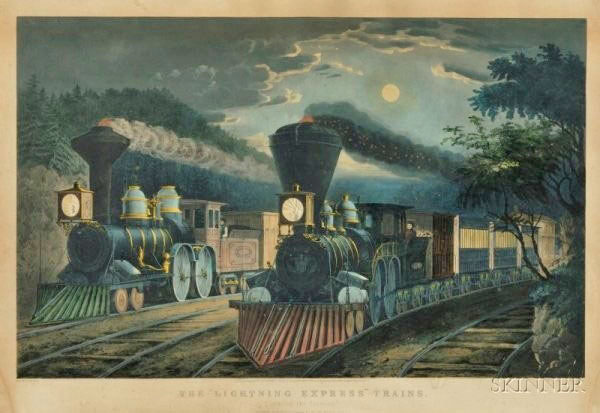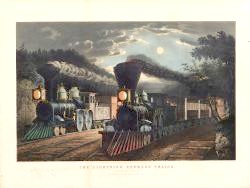The Lightning Express
"Hurry!! She's a comin, right now!"Henry Jarrett was a partner in the firm of Jarrett & Palmer that managed the Booth Theater in New York City. In the spring of 1876, they had mounted a successful production of Shakespeare's "Henry V" starring Lawrence Barrett. After the show closed in Manhattan, it was scheduled to reopen with the same cast in San Francisco. Jarrett contracted with the Pennsylvania Railroad, the Pittsburgh, Fort Worth & Chicago, the Chicago & North Western, the Union Pacific and the Central Pacific to get his troupe across the continent in style.
 |
| American Railroad Scene: Lightning Express Leaving the Junction 1871, C0185-G0199 |
The transcontinental dash, dubbed "Lightning Express", departed Jersey City NJ on the Pennsylvania Railroad after actors and dignitaries arrived via ferry from Manhattan. In the mid 1870s, a coast-to-coast rail trip routinely took seven days, averaging about 20 mph including stops. "Lightning Express" was expected to make the trip in four days, but in the end managed to arrive twelve hours ahead of schedule. It ran day and night, pausing the shortest times possible for engine and crew changes.
Central Pacific crews went above and beyond the call of duty to maintain and exceed the Lighting Express's demanding schedule. Engine #149, a 4-4-0 named "Black Fox", pulled the train on CPRR's entire 875-mile segment. For most of the run, she was driven by Henry S. "Hank" Small, who received a gold medal upon arrival in San Francisco.
 |
| The Lightning Express |
Everywhere along the train's route, newspapers hyped its coming; fireworks were set off; crowds gathered at trackside to watch its passing; and church bells were rung to awaken sleepers when the Lightning Express was due to arrive during the night.
Henry H. Peyton, former Nevada state legislator, had recently passed away in Elko Nevada. On this date in 1876, mourners had gathered at the Elko Presbyterian Church for his funeral, with the Rev. James H. Byers officiating. This service had been announced for 2:00 p.m., since Lightning Express was expected to arrive at 4:00. But just as Byers was preparing to lead the congregation in a hymn, someone burst into the church and yelled, "Here she comes! The train's coming!"
Lightning Express had come early. Mourners, family members, pallbearers, and eventually even the good Rev. Byers rushed out to the depot to see the famous train. After its fifteen-minute stop, they all filed back into the Presbyterian Church to give Peyton a suitably-dignified sendoff.
 |
| Currier & Ives, The 'lightning Express' Trains. 'Leaving the Junction' |
Currier and Ives produced at least three lithographs with this train's name in the title, including "American Railroad Scene: Lightning Express Leaving the Junction".
After World War II, Louis Marx manufactured a steel ride-on locomotive called "Lightning Express".
In 1989, Galoob produced a die-cast toy "Lightning Express" set that consisted of an F7 diesel and four matching passenger cars, decorated in D&RGW yellow / silver.
In 1905, John J. Fitzpatrick composed a "Lightning Express March" for piano.
In 1898, Fred Helf and E. P. Moran published a melodramatic song titled "Please, Mr. Conductor". After these authors failed to renew their copyright in 1925, Triangle Music released the same song as "The Lightning Express" and attributed it to "E. V. Body", which was their cute way of saying that it was now public-domain material.
PLEASE, MR. CONDUCTOR by Fred Helf and E. P. Moran
The lightning express from the depot so grand Had started out on its way All of the passengers that gathered on board Seemed to be happy and gay But one little boy who sat by himself Was reading a letter he had You could plainly tell by the look on his face That the contents of it made him sad
 |
| Currier & Ives, The Lightning Express, Leaving The Junction |
"Please Mr. Conductor Don't put me off of this train The best friend I have in this world sir Is waiting for me in pain Expecting to die any moment sir And may not live through the day I wanna reach home and kiss mother goodbye Before God takes her away"
A girl sitting near was heard to exclaim "If you put him off, it's a shame" Taking his hand, a collection she made The boy's way was paid on the train "I'm obliged to you miss for your kindness to me" "You're welcome," she said, never fear Each time the conductor would pass through the car The boy's words would ring in his ear
"Please Mr. Conductor Don't put me off of this train The best friend I have in this world sir Is waiting for me in pain Expecting to die any moment sir And may not live through the day I wanna reach home and kiss mother goodbye Before God takes her away."
Reference note by p4A contributing editor Joseph Lechner.